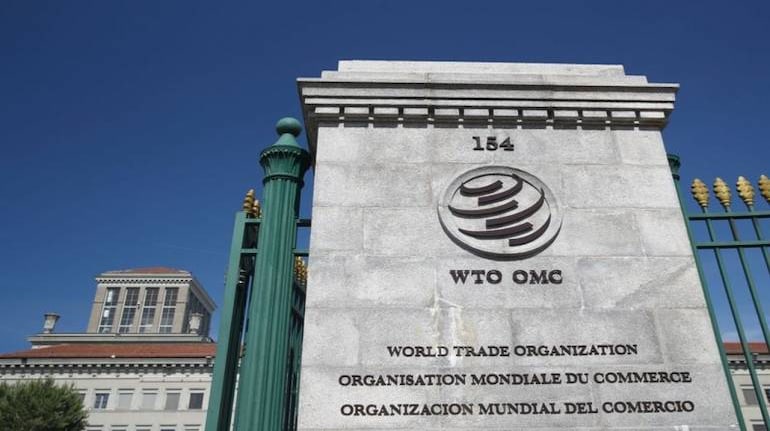



The Ministerial Conference, the top-most decision making body of the World Trade Organization (WTO), sets the global rules of trade.
The summit, therefore, sets the agenda for bilateral and multilateral trade and investments. Decisions taken at the event have long-term consequences in determining shipping volumes, trade flows, customs and monetary policy, and, in turn, the economic prosperity of nations.
While usually it is held once in two years, the upcoming summit in end-November gains immense importance as it is being held for the first time since 2017. The scheduled summit for 2020 was cancelled because of COVID.
Moneycontrol takes a detailed look at the issues of importance, from the right of countries to stockpile foodgrains for public distribution to farm subsidies to the rights of countries to fish in international waters.
Global IP waiver for COVID vaccine
While this will continue to be the singular issue of importance at the upcoming summit, India's need for the waiver is now increasingly decreasing. In October 2020, India and South Africa had proposed talks on a temporary waiver of intellectual property rights for vaccine manufacturers.
The proposal argued in favour of suspending certain parts of the WTO Agreement on Trade-Related Aspects of Intellectual Property Rights (TRIPS), so that vaccines and testing technology for COVID-19 could be easily shared among countries.
Suspending parts of this agreement will allow countries to overcome the legal challenges posed by patents to timely provisioning of affordable medical products. Some WTO nations have had to carry out urgent legal amendments to their national patent laws to expedite the process of issuing compulsory/government use licences.
However, the proposal has not made progress due to the staunch opposition from a handful of nations from the European Union, such as Switzerland, Norway and the United Kingdom.
“They have been emboldened by a non-committal United States, despite the support of almost all WTO member- nations. Since all WTO decisions have to be unanimous, there is nothing that can be done, even if a single nation is unwilling,” a senior trade negotiator said.
Permanent stockholding of foodgrains
The G33, an often-overlooked coalition of developing nations led by India, along with 29 other countries, is planning a major push to the stalled talks on farm rules. India and other developing nations run major public stockholding programmes to purchase, stockpile and distribute foodgrains.
Richer economies say some stockholding programmes are considered to distort trade when they involve purchases from farmers at prices fixed by the governments, such as India's minimum support price (MSP).
The WTO currently has a 'peace clause' that permits uninterrupted implementation of India's food security programme till a permanent solution is found. This allows India to procure and stock foodgrains for distribution to the poor without being penalised by WTO members even if it breaches the 10 percent subsidy cap prescribed by the multilateral trade body.
Farm subsidies
Developed nations at the WTO, led by the US, Canada, Australia and members of the European Union, oppose public stockholding of food crops and want developing nations, including India, to cap the MSP to farmers and limit input subsidies offered for fertiliser, seeds, pesticides and irrigation.
Developed countries have refused to lower high levels of targeted agricultural subsidies provided to their own farmers.
At present, WTO rules on farm subsidies are skewed against developing countries like India which have a large number of poor farmers to support as the pay-outs for MSP are included in the prohibited subsidies that can’t exceed 10 percent (de-minimis level) of the value of production.
The WTO defines de minimis as the minimal amount of domestic support that are allowed — up to 5 percent of the value of production for developed countries, and 10 percent for developing nations.
As a case in point, India provides a subsistence amount of about $260 per farmer per annum compared to over 100 times more in some developed countries.
Fishing rights
The WTO has been entrusted by world leaders with the important task of fixing rules on fishing subsidies. In December 2017, the WTO committed members to prohibit government subsidies, which contribute to overcapacity and over- fishing.
The WTO members have also pledged to eliminate subsidies that contribute to illegal, unreported and unregulated fishing. However, this rule will have clauses allowing special and differential treatment for developing and least-developed countries, which are dependent heavily on fishing for food and income.
Given its enormous impact on fishermen, marine exports and the fact that fish constitutes food for poorer nations, the negotiations have been anything but calm. There is also little doubt that it will have important consequences for millions of Indian fishermen and the country’s marine export sector.
Declining fish stocks threaten to worsen poverty and endanger coastal communities that rely on fishing. Roughly 39 million people depend on captured fisheries for their livelihood, according to the WTO. Healthy seas are also important for food security, with fish providing 20 percent of animal protein needs, on an average for 3.3 billion people.
Discover the latest Business News, Sensex, and Nifty updates. Obtain Personal Finance insights, tax queries, and expert opinions on Moneycontrol or download the Moneycontrol App to stay updated!
Find the best of Al News in one place, specially curated for you every weekend.
Stay on top of the latest tech trends and biggest startup news.